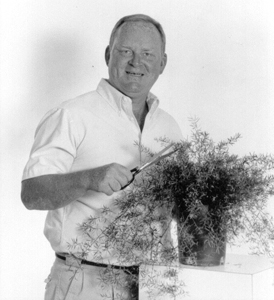ANYTHING BUT TOMATOES
 I have gotten a tremendous amount of phone calls this past week with all kinds of questions concerning tomato seeds and plants. Unfortunately, it is way too early to be planting tomato seeds. It is never too early to be shopping the seed catalogues and finding old and new varieties of seeds for the up-coming season. Once you have the seeds in your possession, plan on planting them no sooner than the first or second week of April. Figure five weeks before the frost-free date (your guess is as good as mine).
I have gotten a tremendous amount of phone calls this past week with all kinds of questions concerning tomato seeds and plants. Unfortunately, it is way too early to be planting tomato seeds. It is never too early to be shopping the seed catalogues and finding old and new varieties of seeds for the up-coming season. Once you have the seeds in your possession, plan on planting them no sooner than the first or second week of April. Figure five weeks before the frost-free date (your guess is as good as mine).
If it were I, I would be trying real hard to figure out how to get an area in the garden readied for direct seed planting of crops that like to be outside during the cold weather. Crops such as radishes, carrots, beets, all kinds of lettuce, spinach and peas just to name a few. Try to locate a large piece of canvas or plastic that could be used to cover a large area of tilled garden soil in hopes of keeping the soil dry so that whenever I was ready to plant these seeds, the area would be ready.
The crops that are in need of warm temperatures and warm soil will never get off to a good start if you try to force them to grow outside too early before all danger of frost has past. And “getting the jump” on the season by starting those seeds inside earlier than necessary is not going to help either as those young seedlings will grow too fast and spindly due to the extra warm temperatures and the lack of full sunlight. Then, by the time you can put them outside, they are already shot.
When timing your seeds, figure 5 weeks for tomatoes and egg-plant, so May 15 minus 5 weeks would put you back to April 10th…no sooner. Peppers take a little longer so, April 3rd. Want to plant some things earlier? Try cabbage, broccoli, cauliflower, kohlrabi or Brussels sprouts. These plants can be started now and be transplanted outside at any time (just don’t pick the coldest nights as their first nights out). They will even tolerate a late snowfall.
And remember that “root” crops such as radishes, beets, carrots, etc. cannot be started then transplanted later as the vegetables will turn out totally crooked. The exception to this rule would be onions as they can be safely transplanted.
- SURPRISE LILIES - August 12, 2016
- PRUNING PERENNIALS IN JULY - July 29, 2016
- WHOOPS — EASY FIX - July 15, 2016


